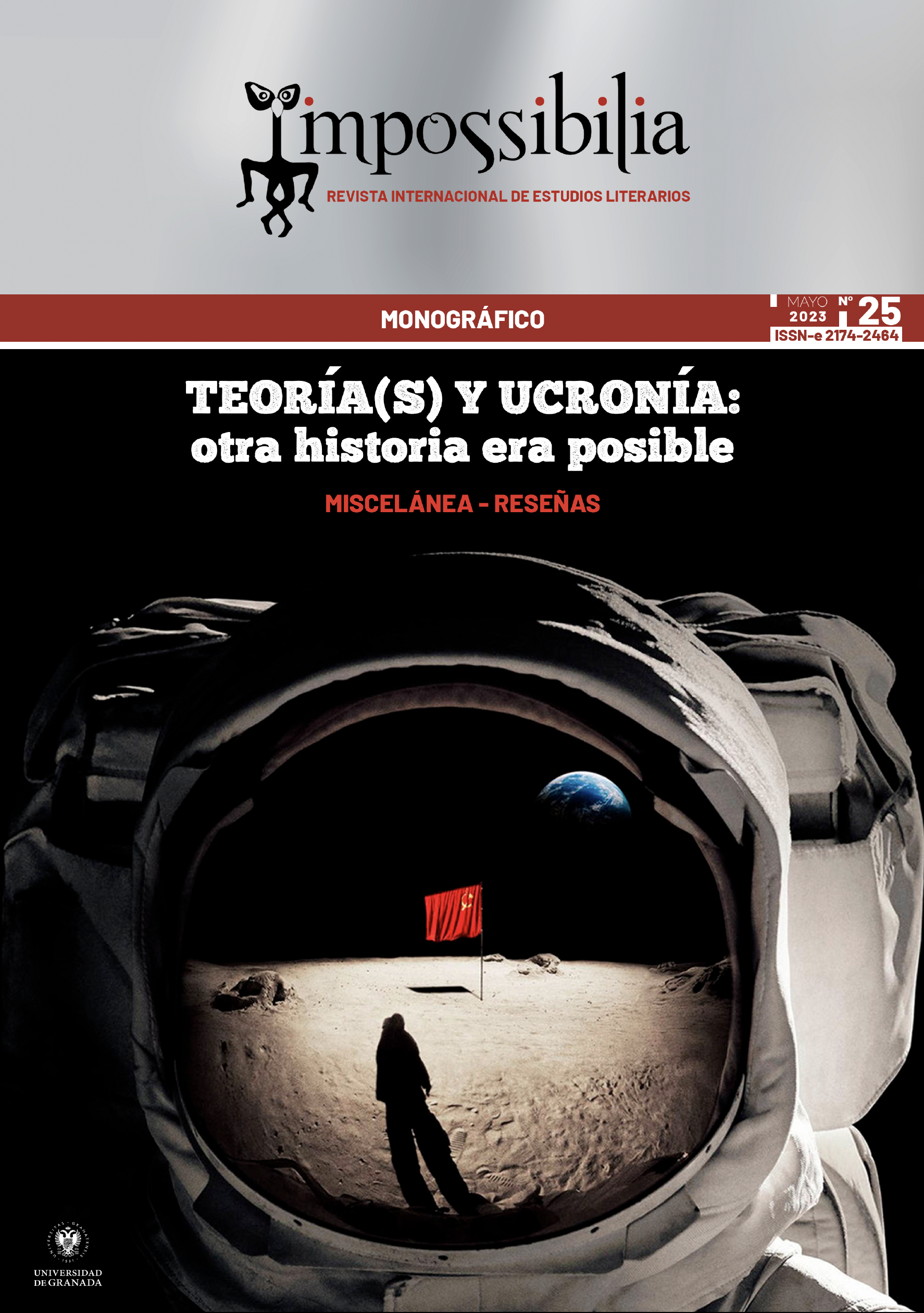Tecnología y catastrofismo: un análisis de necesidad y contingencia en "The Difference Engine" de William Gibson y Bruce Sterling
DOI:
https://doi.org/10.30827/impossibilia.252023.26935Palabras clave:
William Gibson, Bruce Sterling, La máquina diferencial, ucronía, causalidad, necesidad y contingencia.Resumen
Si algo ha caracterizado la mayoría de los estudios sobre obras ucrónicas a lo largo de las últimas décadas, es la falta de consenso con respecto a su auténtica naturaleza, dificultando así la labor de los académicos que tratan de encontrar una definición adecuada del género literario. En 2013, Kathleen Singles publica su libro Alternate History: Playing with Necessity and Contingency, en el que propone una característica determinante de las ucronías: la contemplación de las nociones paradójicas de necesidad y contingencia. Por consiguiente, el principal objetivo de este artículo es exponer las diferentes maneras en las que la novela The Difference Engine (1990) de William Gibson y Bruce Sterling manifiesta esta característica, demostrando así que la propuesta de Singles se trata de una valiosa aportación al campo de los estudios ucrónicos.
Descargas
Citas
ALKON, Paul. (1994). Alternate History and Postmodern Temporality. En CLEARY, Thomas R. Time, Literature and the Arts: Essays in Honor of Samuel L. Macey (pp. 65-85). Victoria, Canada: University of Victoria.
CARLYLE, Thomas. (1841). On Heroes, Hero-Worship, and the Heroic in History. Project Gutenberg. https://www.gutenberg.org/files/1091/1091-h/1091-h.htm.
DICK, Philip K. (1962). The Man in the High Castle. Milton Keynes, United Kingdom: Penguin.
DISRAELI, Benjamin. (1845). Sybil, or The Two Nations. Oxford: Oxford University Press.
FISCHLIN, Daniel; HOLLINGER, Veronica; TAYLOR, Andrew; GIBSON, William; & STERLING, Bruce. (1992). "The Charisma Leak": A Conversation with William Gibson and Bruce Sterling. Science Fiction Studies 19(1), 1-16.
GALLAGHER, Catherine. (2007). War, Counterfactual History and Alternate-History Novels. Field Day Review, (3), 52-65.
GIBSON, William; & STERLING, Bruce. (1990). The Difference Engine. Londres: Gollancz.
HELLEKSON, Karen. (2001). The Alternate History: Configuring Historical Time. Ohio: The Kent State University Press.
HUTCHEON, Linda. (1989). Historiographic Metafiction: Parody and the Intertextuality of History. En O’DONNELL, Patrick; & CON DAVIS, Robert. Intertextuality and Contemporary American Fiction (pp. 3-32). Baltimore: John Hopkins University Press.
JAGODA, Patrick. (2010). Clacking Control Societies: Steampunk, History, and the Difference Engine of Escape. Neo-Victorian Studies, 3(1), 46-71.
PADUA, Sydney. (2015). The Thrilling Adventures of Lovelace and Babbage: The (Mostly) True Story of the First Computer. Nueva York: Pantheon Books.
PORUSH, David. (1991). Prigogine, Chaos and Contemporary Science Fiction. Science Fiction Studies, 18(3), 367-386.
RANSOM, Amy J. (2010). Warping Time: Alternate History, Historical Fantasy, and the Postmodern uchronie québécoise. Extrapolation, 51(2), 258-280.
REAL ACADEMIA ESPAÑOLA. (2022). Catastrofismo. En Diccionario de la lengua española. https://dle.rae.es/catastrofismo
RICOEUR, Paul. (1983). Time and Narrative: Volume 1. (Trad. MCLAUGHLIN, Kathleen; & PELLAUER, David). Chicago: The University of Chicago Press.
ROSENFELD, Gavriel D. (2002). Why Do We Ask “What If?”: Reflections on the Function of Alternate History. History and Theory, 41(4), 90-103.
ROSENFELD, Gavriel D. (2005). The World Hitler Never Made: Alternate History and the Memory of Nazism. Nueva York: Cambridge University Press.
SCHNEIDER-MAYERSON, Matthew. (2009). What Almost Was: The Politics of the Contemporary Alternate History Novel. American Studies, 50(3/4), 63-83.
SINGLES, Kathleen. (2013). Alternate History: Playing with Contingency and Necessity. Berlín/Boston: Walter de Gruyter.
SCHMUNK, Robert B. (1991). Uchronia: The Alternate History List. HTML. http://www.uchronia.com/
SPEDO, Giampaolo. (2009). The Plot Against the Past: An Exploration of Alternate History in British and American Fiction. [Tesis doctoral no publicada]. Padua: Universidad de Padua.
SPENCER, Nicholas. (1999). Rethinking Ambivalence: Technopolitics and the Luddites in William Gibson and Bruce Sterling’s The Difference Engine. Contemporary Literature, 40(3), 403-429.
SUSSMAN, Herbert. (1994). Cyberpunk Meets Charles Babbage: The Difference Engine as Alternative Victorian History. Victorian Studies 38(1), 1-23.
WHITE, Hayden. (1973). Metahistory: The Historical Imagination in Nineteenth-century Europe. Baltimore: The John Hopkins University Press.
WINTHROP-YOUNG, Geoffrey. (2009). Fallacies and Thresholds: Notes on the Early Evolution of Alternate History. Historical Social Research / Historische Sozialforschung 34(2), 99-117.
Publicado
Cómo citar
Número
Sección
Licencia
Derechos de autor 2023 Impossibilia. Revista Internacional de Estudios Literarios

Esta obra está bajo una licencia internacional Creative Commons Atribución-NoComercial-SinDerivadas 4.0.



















